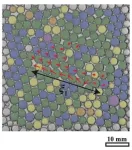Happy childhood? That's no guarantee for good mental health
2021-02-07
(Press-News.org) It's well understood that a difficult childhood can increase the likelihood of mental illness, but according to new research from the University of South Australia, a happy and secure childhood does not always protect a child from developing a mental illness later in life.
Conducted in partnership with the University of Canberra, the finding is part of a study published in Current Psychology, which examined how early childhood experiences relate to different developmental pathways, and how these might be associated with poor mental health.
Given that both positive and negative childhood experiences were found to manifest as anxiety or other mental health disorders into adulthood, researchers believe that it's our ability to adapt - or rather not adapt - to unexpected scenarios that might be influencing mental health.
In Australia, almost 50 per cent of the population will experience mental illness at some point in their lives, with an estimated 314,000 children aged 4-11 (almost 14 per cent) experiencing a mental disorder.
The national recurrent expenditure on mental health-related services is estimated at $9.9 billion or about $400 per person.
While the study reaffirmed that people who had adverse and unpredictable early life experiences had elevated symptoms of poor mental health (including depression and paranoia), it also found that children who grew up in stable and supportive environments were also at risk of experiencing symptoms of anxiety in adulthood.
Lead researcher, and PhD candidate, UniSA's Bianca Kahl, says the study highlights the indiscriminate nature of mental illness and reveals key insights about potential risk factors for all children.
"As the prevalence of mental health conditions expands, it's imperative that we also extend our knowledge of this very complex and varied condition," Kahl says.
"This research shows that mental health conditions are not solely determined by early life events, and that a child who is raised in a happy home, could still grow up to have a mental health disorder.
"There's certainly some missing factors in understanding how our childhood environment and early life experiences might translate into mental health outcomes in adulthood.
"We suspect that it's our expectations about our environments and our ability to adapt to scenarios when our expectations are not being met, that may be influencing our experiences of distress.
"If, as children, we learn how to adapt to change, and we learn how to cope when things do not go our way, we may be in a better position to respond to stress and other risk factors for poor mental health.
"Testing this hypothesis is the focus of the next research study."
INFORMATION:
[Attachments] See images for this press release:

ELSE PRESS RELEASES FROM THIS DATE:
2021-02-06
Tokyo, Japan - Researchers from Tokyo Metropolitan University studied the dynamics of foams. When a drop of water was added to a foam raft, the bubbles rearranged themselves to reach a new stable state. The team found that bubble movement was qualitatively different depending on the range of bubble sizes present. Along with analogies with soft-jammed materials, these findings may inspire the design of new foam materials for industry.
Foams are everywhere. Whether it's soaps and detergents, meringues, beer foam, cosmetics or insulation for clothing and building, we're surrounded by everyday ...
2021-02-06
There is an urgent need for guidelines on how schools can use ventilation to reduce the risk of COVID-19 transmission in the classroom, according to doctors at Imperial College London and the headteacher of a secondary school in Pinner, Middlesex. In a commentary published by the Journal of the Royal Society of Medicine, the authors say that improving air quality in classroom spaces should be as important as following government advice regarding social distancing, mask-wearing and hand washing.
The authors point to lessons from the airline industry, where the risk of contracting COVID-19 on a flight ...
2021-02-06
6 February: The IMbrave150 trial found median overall survival was 19.2 months in patients treated with atezo+bev vs 13.4 months for those treated with sorafenib alone, the current standard treatment (HR, 0.66 [95% CI, 0.52-0.85]; P=0.0009). Survival at 18 months was 52% with atezo+bev and 40% in patients treated with sorafenib.
All patients in the trial had nonresectable HCC - the most common form of liver cancer - and had not previously been treated with systemic therapy. A total of 501 patients were treated in the multicentre, open label, randomised controlled trial and the new follow-up figures confirm the superiority of the atezo+bev combination over sorafenib in this group of patients with HCC.
Atezolizumab is an immune ...
2021-02-06
Around one in three working-age adults (29%) surveyed in France in July 2020 would refuse any COVID-19 vaccine.
Willingness to receive a COVID-19 vaccination depended upon its country of origin, effectiveness, rate of serious side effects, and site of vaccination.
Although attitudes may have changed since July 2020 with the approval of several vaccines and a second wave of COVID-19, the findings suggest that communicating the collective benefits of herd immunity reduced people's hesitancy about being vaccinated.
Nearly one in three working-age adults in France (29%) surveyed in July 2020 - when lockdown restrictions had been ...
2021-02-06
TORONTO (February 5, 2021) - A clinical study led by Dr. Jordan Feld, a liver specialist at Toronto Centre for Liver Disease, University Health Network (UHN), showed an experimental antiviral drug can significantly speed up recovery for COVID-19 outpatients - patients who do not need to be hospitalized.
This could become an important intervention to treat infected patients and help curb community spread, while COVID-19 vaccines are rolled out this year.
"This treatment has large therapeutic potential, especially at this moment as we see aggressive variants of the virus spreading around the globe which are less sensitive to both vaccines and treatment ...
2021-02-05
NEW YORK, NY (Feb. 5, 2020)--Cells used to study the human blood brain barrier in the lab aren't what they seem, throwing nearly a decade's worth of research into question, a new study from scientists at Columbia University Vagelos College of Physicians and Surgeons and Weill Cornell Medicine suggests.
The team also discovered a possible way to correct the error, raising hopes of creating a more accurate model of the human blood-brain barrier for studying certain neurological diseases and developing drugs that can cross it.
The study was published online Feb. ...
2021-02-05
Washington, DC, February 5, 2021 - A study in the Journal of the American Academy of Child and Adolescent Psychiatry (JAACAP), published by Elsevier, reports that in a diverse, cross-national sample of youth, physical discipline and cognitive deprivation had distinct associations with specific domains of developmental delay. The findings are based on the Multiple Indicator Cluster Surveys, which is an ongoing, international household survey initiative coordinated and assisted by the United Nations agency, UNICEF.
"Physical discipline and cognitive deprivation are well-established risks to child development. However, it is rare that these experiences are examined in relation to each other," said lead author ...
2021-02-05
UNIVERSITY PARK, Pa.-- When actor Tom Hanks announced his COVID-19 diagnosis on March 11, 2020, many Americans were still learning about the virus and its severity. According to new research, Hanks' announcement may have affected how some people understood the virus and their behavior toward its prevention.
The day after Hanks posted the news on social media, Jessica Gall Myrick, an associate professor in the Donald P. Bellisario College of Communications at Penn State, and Jessica Fitts Willoughby, associate professor at Washington State University, surveyed 682 people about their attitudes and behaviors toward COVID-19.
Just under 90% of the people surveyed had heard about Hanks' social ...
2021-02-05
Virtual reality isn't just for gaming. Researchers can use virtual reality, or VR, to assess participants' attention, memory and problem-solving abilities in real world settings. By using VR technology to examine how folks complete daily tasks, like making a grocery list, researchers can better help clinical populations that struggle with executive functioning to manage their everyday lives.
Lead author Zhengsi Chang is a PhD student that works in the lab of Daniel Krawczyk, PhD, deputy director of the Center for BrainHealth®. Along with Brandon Pires, a researcher at Texas Tech University Health Sciences Center, the team investigated whether VR can be used to effectively test ...
2021-02-05
New research affirms a unique peptide found in an Australian plant can destroy the No. 1 killer of citrus trees worldwide and help prevent infection.
Huanglongbing, HLB, or citrus greening has multiple names, but one ultimate result: bitter and worthless citrus fruits. It has wiped out citrus orchards across the globe, causing billions in annual production losses.
All commercially important citrus varieties are susceptible to it, and there is no effective tool to treat HLB-positive trees, or to prevent new infections.
However, new UC Riverside research shows that a naturally occurring peptide found in HLB-tolerant citrus relatives, such as Australian finger lime, can not only kill the bacteria that causes the disease, it can also activate the plant's ...
LAST 30 PRESS RELEASES:
[Press-News.org] Happy childhood? That's no guarantee for good mental health



